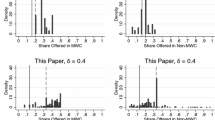Abstract
This essay reports the results of ninety 3-person and 5-person bargaining experiments using several alternative vote trading scenarios. These experiments are designed to test: (1) Riker and Brams' controversial hypothesis that vote trading can yield inferior outcomes as against the alternative hypothesis that vote trading induces ‘market-like’ efficiency in voting bodies; (2) the relative adequacy of several game theoretic solution concepts for vote trading games without a Condorcet winner (core); and, (3) the adequacy of the core itself.
First, on the basis of eighteen experiments with binding commitments, we find some support for Riker and Brams' hypothesis: in nine trials, subjects first trade to a Pareto dominated outcome. In five of these trials, however, these outcomes are eventually displaced by Pareto efficient ones. Without binding commitments, however, we find little support for the ‘paradox of vote trading’ hypothesis. Specifically, while six of seven trials of a 3-person game yield ‘equitable’ outcomes, seventeen trials of several 5-person games without binding commitments strongly support the competitive solution as a cooperative game solution concept, and suggest that the V-set and M 1 bargaining set are either redundant or useless. Seven trials each of six 5-person games with a condorcet winner (core), however, suggest that usual static solution concepts may be inadequate for treating games with any interesting degree of strategic complexity.
Similar content being viewed by others
References
Berl, Janet, McKelvey, Richard D., Ordeshook, Peter C., and Winer, Mark. (1976). ‘An Experimental Test of the Core in a Simple N-Person Cooperative Nonsidepayment Game.’ Journal of Conflict Resolution, 20: 453–79.
Fiorina, Morris, and Plott, Charles. (1978). ‘Committee Decisions Under Majority Rule: An Experimental Study.’ American Political Science Review (forthcoming).
Haefle, Edwin T. (1970). ‘Coalitions, Minority Representation, and Vote Trading Probabilities.’ Public Choice, 8: 75–90.
Isaacs, R. Mark, and Plott, Charles. (1978). ‘Cooperative Game Models of the Influence of the Closed Rule in Three Person Majority Rule Committees: Theory and Experiments.’ In P.C. Ordeshook (Ed.), Game Theory and Political Science. New York: New York University Press.
Laing, James D., and Olmstead, Scott. (1978). ‘Policy Making by Committees: An Experimental and Game Theoretic Study.’ In P.C. Ordeshook (Ed.), Game Theory and Political Science. New York: New York University Press.
McKelvey, Richard D., and Ordeshook, Peter C. (1978a). ‘Competitive Coalition Theory.’ In P.C. Ordeshook (Ed.), Game Theory and Political Science. New York: New York University Press.
McKelvey, Richard D., and Ordeshook, P.C. (1978b). ‘An Experimental Test of Several Theories of Committee Decision-Making Under Majority Rule.’ Carnegie-Mellon University. Mimeo.
McKelvey, Richard D., Ordeshook, P.C., and Winer, M. (1978). ‘The Competitive Solution for N-Person Games Without Sidepayments.’ American Political Science Review, 72: 599–615.
Riker, William H., and Brams, Steven J. (1973). ‘The Paradox of Vote Trading.’ American Political Science Review, 67: 1235–47.
Tullock, Gordon. (1970). ‘A Simple Algebraic Logrolling Model.’ American Economic Review, 56: 1105–22.
Wilson, Robert. (1969). ‘An Axiomatic Model of Logrolling.’ American Economic Review, 59: 331–41.
Author information
Authors and Affiliations
Additional information
This research is supported by a National Science Foundation grant. We also wish to acknowledge the assistance of Rod Gretlein and Mark Winer.
Rights and permissions
About this article
Cite this article
McKelvey, R.D., Ordeshook, P.C. Vote trading: An experimental study. Public Choice 35, 151–184 (1980). https://doi.org/10.1007/BF00140840
Issue Date:
DOI: https://doi.org/10.1007/BF00140840




